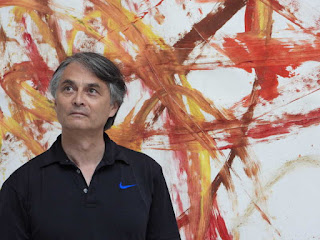ISO's latest 'Greetings': Japan as East-Meets West symbol and as cultural appreciation
This weekend Jun Märkl returns to the Hilbert Circle Theatre podium as the Indianapolis Symphony Orchestra's artistic advisor with an appropriate program, given his German-Japanese heritage: "Greetings from Japan" continues the "postcard" theme of many Classical Series concerts in 2021-22.
A favorite of the opera repertoire is being marketed as the program's chief attraction. Puccini's "Madama Butterfly," represented here by its third act, with vocal soloists from Indiana University's Jacobs School of Music, has lately had a swirl of controversy connected to its patronizing (some would say racist) attitudes toward the Orient, as well as to questions of proper casting.
 |
| Jun Märkl: Three aspects of Japan's musical presence. |
Japonisme, the cultural movement that followed the opening up of Japan to the West in the 1850s, produced the stories on which Puccini based his opera and generated a European fad for Japanese art and decoration. So it's a period piece — always a dangerous category for a work of art to fall into. Japonisme also tossed up the delightful Gilbert & Sullivan operetta "The Mikado," which lies under much more of a shadow than "Madama Butterfly" and I suspect is rarely staged nowadays.
On Friday evening, in the second of three presentations (the series concludes this afternoon at 5:30), the performance was thoroughly effective in giving the orchestra writing more stature than it usually receives from the opera house pit. Märkl had the orchestra in magisterial form in the Intermezzo, which introduces the final act. Effective in its initial ominousness, the music gradually lightens into a depiction of daybreak. The abandoned geisha, hopeful of Pinkerton's good intentions after many signs of disappointment, seems to bathe emotionally in the warmth for a while.
Vocally and dramatically well-suited to each other, soprano Alejandra Villareal Martinez and mezzo-soprano Deepa Johnny put across the clash of realistic and romantic outlooks that Suzuki and Cio-Cio-San divide between them. The reappearance of Pinkerton (Michael Deshield) and the U.S. Consul Sharpless (Jeremiah Sanders) sets up the final break between Cio-Cio-San and her dreams. When staged, there is a plethora of sightings and vanishings among the characters, including the brief but crucial entrance of Pinkerton's "real" wife, Kate (Antoinette Pompe van Meerdervoort). Most poignant in any staged version is the product of the geisha/navyman union, a toddler named Trouble, and his mother's farewell to him. The mute role indeed causes trouble in many productions, as it must be played either by a child who is normally too big for a three-year-old or by a sizable doll in swaddling clothes, as in a Nativity pageant.
Wisely, the child figure was simply omitted in this semi-staged version. The sacrifice is that the mimed action involving the child comes off as purely legalistic, with the signing and exchange of adoption papers that will allow Trouble to be raised by the Pinkertons in America. It is left to the music to fully convey the wrenching emotions that accompany the forced parting of mother and child. She presses to her bosom a small cloth doll (resembling the "poppet" one might see in a production of "The Crucible") and commits hara-kiri, followed by thunderous orchestral stabs and offstage cries of "Butterfly!" from Pinkerton.
Highlights of the singing were a magnificent trio for Pinkerton, Sharpless, and Suzuki and a solo outpouring from Cio-Cio-San, given more than sufficient brilliance and passion by the featured soprano.
Before intermission, Märkl led the first ISO performance of "Circulating Ocean" by the contemporary Japanese composer Toshio Hosokawa. At just over 20 minutes, this compelling soundscape evokes the volume (in the senses of loudness and bulk alike), motion, immensity, and surface sheen of Earth's largest body of water — a defining aspect of nature for all residents of Hosokawa's island homeland.
Märkl has recorded the work with a couple of European orchestras whose performances can be heard on YouTube, and his introduction of "Circulating Ocean" here was assured, vivid, and continuously placed under exquisite control. Swells and subsidings of ensemble sound had an almost sculptural firmness.
The concert opened with a nice contrast: a superficial yet deftly engaging evocation of Japonisme in musical form: Saint-Saëns' overture to a one-act opera called "La princesse jaune," op. 30. A special feature of the performance was Roger Roe's evocative English-horn solo, which earned the solo bow that Märkl accorded him.



Comments
Post a Comment